________________
22
OUTLINES OF INDIAN PHILOSOPHY sympathy and kindness for fellow-men. There are other differences as well such as the pursuit of ascetic morality by the heterodox, as the sole mode of practical discipline, and by the orthodox as only a preparation for a fresh course of training which may itself be different in different schools. But whatever the differences in matters of detail, asceticism as such serves as a bond of union between the two traditions. Even systems which do not at first appear to countenance it are, as a little reflection will show, really favourable to it. Thus ritualism with its promise of prosperity in a world to come actually results in complete self-denial so far as this world is concerned, because the fruit of the deeds it prescribes is to be reaped not here, but elsewhere and amidst conditions totally different from those of the present life. The principle of detachment implicit in such doctrines was, as we shall see, rendered explicit, and even the ulterior motive of self-love which is involved in striving for reward hereafter was eliminated by the Gītā with its teaching of disinterested action.
Owing to the spirit of renunciation that runs through them all, the way of life which the Indian doctrines prescribe may be characterized as aiming at transcending morality as commonly understood. In other words, the goal of Indian philosophy lies as much beyond Ethics as it does beyond Logic. As however the rationale of the ascetic ideal is explained in two different ways by Indian thinkers, the supermoral attitude bears a somewhat different significance in the several schools; but this distinction does not, like the previous one, correspond to the division into orthodox and heterodox traditions. Some schools admit the ultimacy of the individual self while others deny it in one sense or another. Buddhism for example altogether repudiates the individual self as a permanent entity, while Absolutism takes it as eventually merging in the true or universal self so that its individuality is only provisional. Theism on the other hand like that of Rāmānuja and pluralistic systems like Jainism or the Nyāya-Vaišeşika recognize the individual self to be ultimate, but point out that the way to deliverance lies only through the annihilation of egoism




